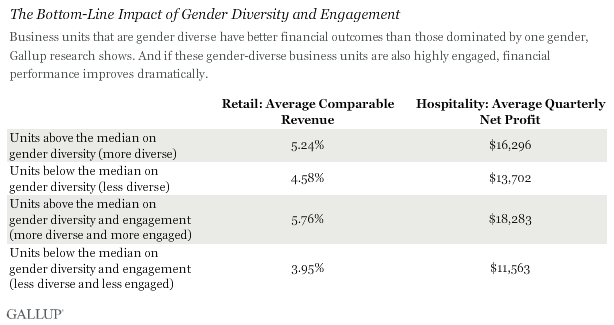Men and women have different viewpoints, ideas, and market insights, which enables better problem solving.
Gender diversity is vital to any workplace. Not just because it's a laudable goal; it simply makes bottom-line business sense. If you need proof, look no further than a recent Gallup study, which finds that hiring a demographically diverse workforce can improve a company's financial performance.
The study of more than 800 business units from two companies representing two different industries -- retail and hospitality -- finds that gender-diverse business units have better financial outcomes than those dominated by one gender:
- Gender-diverse business units in the retail company have 14% higher average comparable revenue than less-diverse business units (5.24% vs. 4.58%).
- Gender-diverse business units in the hospitality company show 19% higher average quarterly net profit ($16,296 vs. $13,702) than less-diverse business units.
And if the gender-diverse business units are also highly engaged, financial performance improves dramatically. Retail units that are diverse and engaged have a 46% higher increase in comparable revenue. Similarly, diverse and engaged units in the hospitality company have a 58% higher net profit than single-gender and less-engaged units. These results show the additive effect of gender diversity and engagement on a company's bottom line.

The advantages of gender-diverse teams
Our research suggests that gender-diverse teams perform better than single-gender teams for several reasons:
- Men and women have different viewpoints, ideas, and market insights, which enables better problem solving, ultimately leading to superior performance at the business unit level.
- A gender-diverse workforce provides easier access to resources, such as various sources of credit, multiple sources of information, and wider industry knowledge.
- A gender-diverse workforce allows the company to serve an increasingly diverse customer base.
- Gender diversity helps companies attract and retain talented women. This is especially relevant as more women join the labor force around the world. Companies cannot afford to ignore 50% of the potential workforce and expect to be competitive in the global economy.
For these reasons and others, it makes sense for businesses to make gender diversity a priority.
What companies should do
A key finding of this study is that gender-diverse and engaged business units outperform those that are less diverse and less engaged. Managers not only need to increase gender diversity in business units but also create workplaces that engage employees. Open, trusting, and supportive relationships among coworkers and supervisors unleash the power of diversity by enabling employees to turn their differences in thought, behavior, skills, knowledge, and talent into innovative ideas and practices that can drive a company forward.
Secondly, the study finds that gender diversity varies substantially across business units within a company, which in turn affects the business performance of these units. To achieve the real benefits that diversity can bring, leaders and managers must look carefully at the gender balance in specific business units when designing and implementing a strategy to increase diversity. A blanket policy designed to increase overall gender diversity at a company, for example, is unlikely to achieve the desired results or to increase financial performance.
Making gender diversity a business priority can lead to financial benefits and help a company realize its full potential. To reap the bottom-line benefits that diversity can bring, business leaders must:
- Identify business units that are less gender diverse.
- Develop a hiring strategy that increases gender diversity in these units without reducing or ignoring merit. For example, studies indicate that when women feel they are hired to fill quotas, it negatively affects relationships between coworkers.
- Create an engaged culture that enables men and women to form trusting relationships and motivates them to perform at a high level.
- Set inclusiveness goals, and hold managers accountable for diversity.
Create a diverse and engaged organization:
- Learn more about what drives organizational culture.
- Transform your organization's culture by partnering with Gallup.



